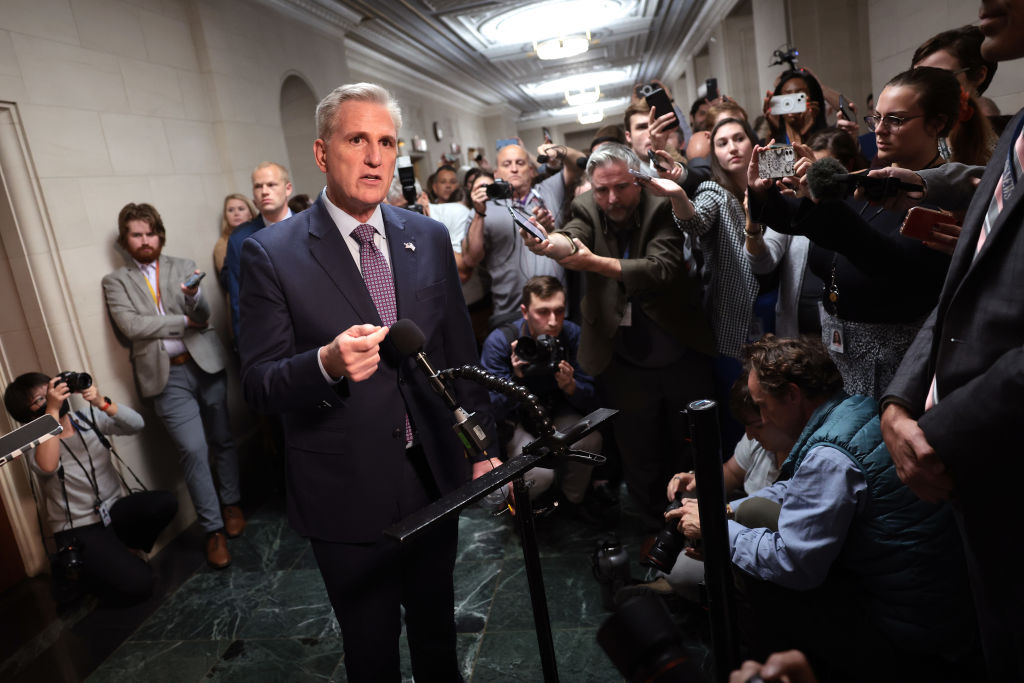
In the current line of thinking among many American conservatives, Palestinian militants’ horrific attack on Israeli civilians over the weekend can be at least slightly blamed on President Joe Biden’s policies. In this telling, a substantial measure of that fault has to do with the administration’s attempts to address climate change, though how exactly that connection works is a bit fuzzy.
That, at least, was one takeaway from ex-House Speaker Kevin McCarthy’s (R-Calif.) comments to reporters on Monday in the bloody aftermath of the Hamas attacks on Israel. The remarks contained many of the national security jabs one might expect—the President being, in McCarthy’s description, soft on Iran, weak on border security, and generally terrible at projecting U.S. strength abroad.
We’ll leave the dissection of some of those criticisms to our colleagues in Washington D.C. We will also leave aside the question of any role decades of unstinting and bipartisan U.S. support for Israel may have played in perpetuating the conflict, as the Israeli Defense Forces lays siege to a Palestinian enclave of 2.2 million that Israel’s prime minister has vowed to reduce to “rubble.” Instead, we’ll focus on one of McCarthy’s critical points: that Biden’s green policies have come at the expense of America’s national security interests and those of its allies, and—as the former speaker appeared to imply—indirectly created the conditions for the Hamas attacks.
More From TIME
“President Biden has said previously that he believes the number one threat America is facing is climate change. That is not true,” McCarthy said, going on to list terrorism, border security, energy production and Iranian, Russian, and Chinese power as greater threats. “Rather [than] focus on his Green New Deal, he should focus on protecting the American people,” he said.
Basically, McCarthy’s argument seemed to be that America and its allies are safer when the U.S. produces more oil. By “attacking” American oil production, Biden has empowered hostile petro-states like Iran and Russia.
A version of this story also appears in the Climate is Everything newsletter. To sign up, click here.
You can imagine U.S. environmental progressives saying to themselves, "would that it were!" Biden’s stance on new drilling has been, in essence, a balancing act between pacifying green advocates furious over his decision in March to permit a massive new oilfield in Alaska, and the political reality that high prices at the gas pump tend to be a one-way ticket to a one-term presidency. McCarthy omitted the fact that U.S. oil production is on track to set new records this year and next, despite an urgent mandate from the world’s scientists to cut fossil fuel emissions. Rather than squeezing oil production, Biden’s climate strategy has hinged on creating financial incentives for green energy and manufacturing. Perhaps the biggest bitter pill Democrats had to swallow when passing last summer’s Inflation Reduction Act was to allow even more oil drilling in exchange for desperately-needed green subsidies.
Beyond that, there’s good national security justification for cutting carbon emissions (Not to mention the imperative to help avert untold human misery around the world and potential civilization-level catastrophe). Unchecked global warming will swamp the U.S. with climate refugees, batter coastlines with mega-storms, and threaten food supplies, infrastructure, and even military bases overseas, and altogether make the world a more violent, unstable place. It’s also just obviously a good move, geopolitically speaking, for the U.S. to invest in building up its capacity to manufacture batteries and wind and solar energy, rather than allowing China to corner the global market. With the costs of those technologies falling, doubling down on fossil fuels would be akin to investing in horses back when the world was transitioning to petroleum.
None of that, though, will likely dissuade conservatives from attempting to use climate action as a cudgel to batter Democrats in the lead up to next year’s election. The strategy, it seems, is to paint a connection between emissions cuts and any current crisis, as if any attention the government spares for our biosphere must necessarily come at the expense of something else. But, as National Security Council Coordinator for Strategic Communications John Kirby told FOX News on Monday, with the vast resources of the federal government, not to mention a $816.7 billion defense budget, we’re perfectly capable of doing more than one thing at once. “We are a big enough, and powerful enough, and effective enough nation to be able to look after all these disparate national security threats,” Kirby said. “And one of them absolutely is climate change.”
More Must-Reads from TIME
- L.A. Fires Show Reality of 1.5°C of Warming
- Home Losses From L.A. Fires Hasten ‘An Uninsurable Future’
- The Women Refusing to Participate in Trump’s Economy
- Bad Bunny On Heartbreak and New Album
- How to Dress Warmly for Cold Weather
- We’re Lucky to Have Been Alive in the Age of David Lynch
- The Motivational Trick That Makes You Exercise Harder
- Column: No One Won The War in Gaza
Write to Alejandro de la Garza at [email protected]